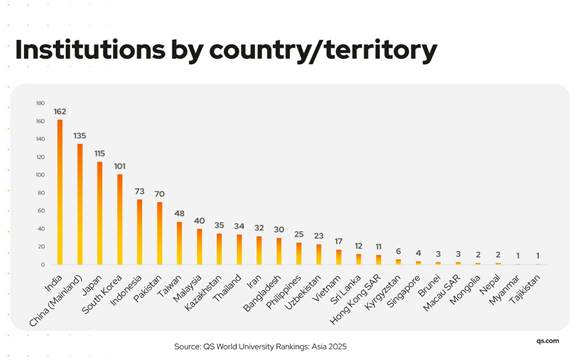India shines in QS World University Rankings: Asia 2025
7 Indian Institutes in Top 100
The QS World University Rankings: Asia 2025 reflect the
dynamic landscape of higher education across the continent, spotlighting the
top institutions excelling in academic and research excellence, innovation, and
internationalisation. This year’s rankings emphasise the growing competition
among Asian universities and showcase the region's commitment to advancing
global educational standards.
This edition highlights India's impressive upward trajectory in higher
education across the continent. India boasts two institutions within the top 50
and seven in the top 100 of the QS Asia Rankings 2025, with the Indian
Institute of Technology Delhi (IITD) leading at 44th place. The University of
Petroleum and Energy Studies (UPES) achieved the most significant improvement
among Indian institutions, climbing 70 spots to 148th, driven by notable
advancements in nine of the 11 ranking metrics, especially in International
Research Network, Citations per Paper, and Papers per Faculty. India’s
strongest average indicator scores are in Papers per Faculty and Staff with
PhD.
This ranking assesses 984 institutions covering 25 countries in Eastern,
Southern, South-Eastern and Central Asia. The QS World University Rankings:
Asia 2025 allows institutions and students to make direct comparisons on
institutional performance within their region, with a more granular approach to
metrics. Ran
- India stands out with the highest number of
institutes in the latest rankings, showcasing a diverse array of both
emerging and well-established universities.
- The country dominates the top ten universities
in Southern Asia, with seven institutions making the
list.
- Top 50: India features two institutions — IIT
Delhi (44th) and IIT Bombay (48th).
- Top 100: Five institutions, including IIT
Madras (56), IIT Kharagpur (60), Indian Institute of Science (62), IIT
Kanpur (67), and University of Delhi (81), showcase India's
robust academic standing.
- Top 150: Institutions such as IIT
Guwahati, IIT Roorkee, Jawaharlal Nehru University, Chandigarh University
(120), UPES (148), and Vellore Institute of Technology (150) highlight
the depth of quality education.
- Indian Institute of Technology Delhi (IITD) has achieved the
highest ranking for India, moving up to 44th place from 46th last
year, with an impressive employer reputation score of 99%.
- Indian Institute of Technology Bombay (IITB)
follows closely at 48th and boasts an employer reputation score of
99.5% and an academic reputation score of 96.6%.
- The University of Delhi has improved its
ranking, moving up from 94th to 81st, achieving a high score
of 96.4% in the International Research Network.
- Anna University achieved a perfect score
of 100 in the Papers Per Faculty indicator, emphasising high
research output.
- 15 universities scored above 99% in
the staff with PhD indicator, underscoring the high standard of
education and teaching.
- North Eastern Hill University and University
of Agricultural Sciences, Bangalore attained a perfect score of 100
in faculty-student indicator, demonstrating top-tier academic
credibility.
The Indian education sector has made impressive strides, both globally
and within Asia, as evidenced by the QS World University Rankings 2025. India
earlier saw the inclusion of 46 institutions in the 2025 edition compared to
just 11 in 2015 edition showcasing a 318 per cent increase in
last 10 years among G20 nations. This growth underscores India’s commitment to
fostering academic excellence and enhancing global competitiveness. India’s
educational landscape shines as a model of growth and resilience at
Asia level also with two institutions in the top 50 and seven in the top
100 in Southern Asia region. Led by the Indian Institute of Technology Delhi
(IITD), ranked 44th, India showcases strengths in key areas such as
"Papers per Faculty" and "Staff with PhD," underlining its
dedication to quality education and impactful research. This achievement
emphasizes India's ability to balance research productivity with high-calibre
teaching, establishing it as a formidable competitor among global education
powerhouses and solidifying its reputation as an emerging hub for higher learning
in Asia.


